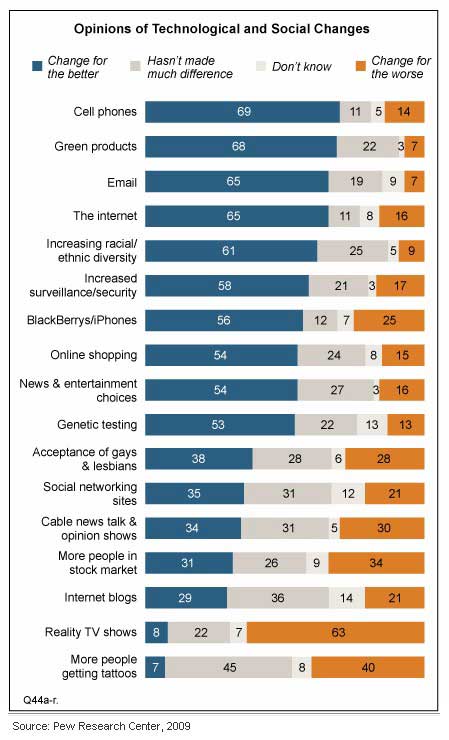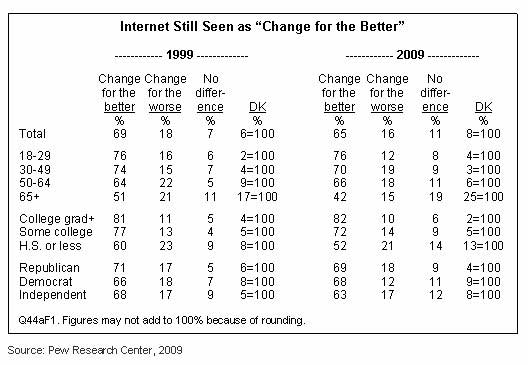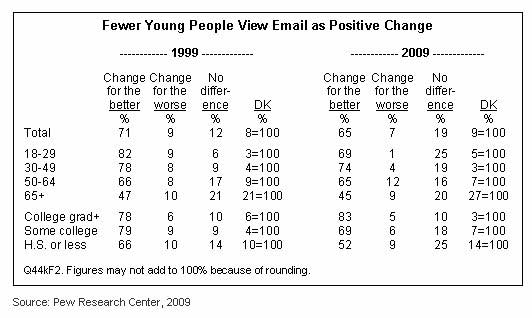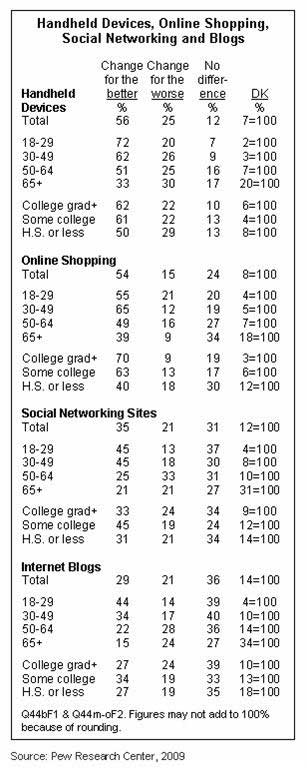As the decade draws to a close, only 27% of Americans have positive things to say about the past 10 years and 50% say they have generally negative feelings about them, according to Pew Research. The Internet, email, and cell phones, however, are viewed by many consumers as a change for the better.
By a wide margin, the 9/11 terrorist attacks are seen as the most important event of the decade, with Barack Obama's election as president a distant second––even among his political supporters.
Happy to put the 2000s behind them, Americans are optimistic that the 2010s will be better: 59% say the next decade will be better than the last for the country as a whole and only 32% say things will be worse.
Technological Advances Viewed Favorably
Major technological and communications advances are viewed in an overwhelmingly positive light by many Americans:
- 69% say cell phones have been a change for the better.
- 65% say so about email.
- 65% say so about the Internet.
- 54% say so about online shopping.

There is greater division of opinion on the benefits of social networking sites and blogs: 35% say social networking sites are a positive change, 31% say the trend hasn't made much of a difference, and 21% say the change is for the worse.
A full majority of Americans (68%) say green products are a beneficial trend.
Reality TV shows are, by a wide margin, the least popular trend tested in the poll: 63% say they have been a change for the worse.
A Decade of the Web
About two-thirds (65%) say the Internet has been a change for the better, while just 16% say it has been a change for the worse; 11% say it hasn't made much difference, while 8% are unsure. This balance of opinion largely mirrors opinions at the close of the 1990s––when the widespread adoption of the Web occurred. In 1999, 69% called the Internet a change for the better and 18% called it a change for the worse.

As with most technological developments, young people and the well educated are particularly likely to embrace the Internet as a change for the better: 76% of young people view the Web as a positive change compared with far fewer (42%) of those age 65+.
Older Americans, however, are no more likely to see the Internet as a change for the worse than are younger people; rather, more seniors simply say it has made no difference or are unsure about its impact.
As was the case in 1999, far more of those with a college degree say the Internet has been a change for the better (82%) than do those with no college experience (52%).
Email Viewed Favorably, Less So by Youth
By an overwhelming margin, more say email has been a change for the better (65%) than say it has been a change for the worse (7%), and 19% say it hasn't made a difference.
Views of email are largely unchanged from a decade ago, though there has been a slight decline in the share describing email as a change for the better. That decline has taken place largely among young people: 69% of those younger than 30 say email has been a change for the better, compared with 82% a decade ago.
Very few young people, just 1%, say email has been a change for the worse, but a quarter of those who came of age in the current decade––with ever-increasing options for real-time, wireless communication––say email has not made much of a difference. In 1999, just 6% of those under 30 expressed that view.

In addition to the Internet and email, cell phones are broadly embraced by the public as a change for the better: 69% say cell phones are a change for the better compared with just 14% who say the changes is for the worse.
Overall, the public's view of cell phones is more favorable than 10 years ago. In 1999, 22% felt that cell phones were a change for the worse—compared with 14% who say so this year.
Other Technological Advances
Handheld devices such as Blackberries and iPhones are seen as a good thing by 56% of Americans, while 25% say the devices have been a change for the worse. The age gap in attitudes toward these devices is particularly wide: 72% of those under 30 consider handheld wireless devices a positive change, compared with just 33% of those 65+.

The public is ambivalent about social networking sites such as Facebook: 35% call them a change for the better, 21% say they have been a change for the worse, while 31% say social networking sites have not made much of a difference and 12% are unsure.
Even among young people, fewer than half (45%) say social networking sites have been a change for the better.
As for blogs, 36% of Americans say the emergence of blogs has not made much of a difference. Slightly fewer (29%) call them a change for the better, while 21% think they have been a change for the worse.



